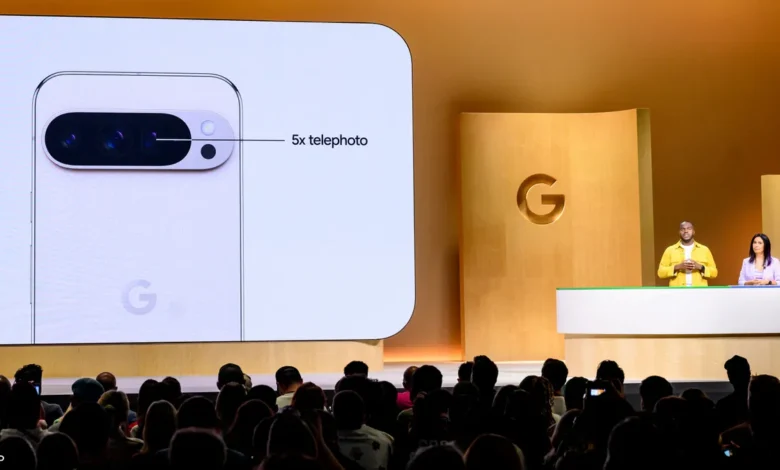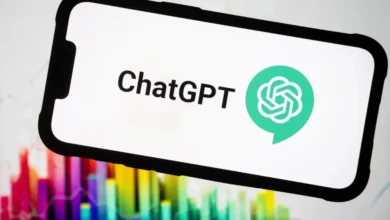Google’s New Phones Offer a Smart Personal Assistant to Manage Your Life

On Tuesday, Google showcased features of its new generation of Pixel smartphones powered by generative artificial intelligence, continuing its quest to create assistive tools based on this technology that are increasingly tailored to each user.
Several Google officials alternated during the presentation held at the company’s headquarters in Mountain View, California, highlighting the advantages of the Pixel 9 phones and other Google smart devices.
However, the star of the event was generative artificial intelligence, as “Gemini,” Google’s main program in this field, is now integrated into the core of the devices, allowing users to interact directly with it.
Ginny Blackburn, a vice president at the company, stated, “Through our demonstrations, you can see how Gemini will assist you on Android by combining real-world knowledge, information related to you, and the apps you use every day.”
Google has a significant advantage in the competition for AI tools, as it can collect user data thanks to its extensive services, including its search engine, mobile operating system Android, and applications like YouTube, Google Maps, and Gmail.
By equipping this AI-based assistant with this information, it can become akin to an all-knowing secretary, available for use at any time and capable of performing a large number of tasks on behalf of the user.
“With User Permission”
Despite its online empire, Google has not managed to assert itself in the smartphone market, where it is dominated by its neighbors Apple, South Korea’s Samsung, and China’s Xiaomi.
However, Apple only recently entered the generative AI race by launching “Apple Intelligence” last June, a year and a half after the intense competition was ignited by OpenAI with ChatGPT.
Google, which is leading the race alongside Microsoft, hopes to give its smartphones a new boost and enhance the appeal of Android.
The Pixel 9 models feature a chip specifically designed for Gemini, capable of understanding and generating data in forms of text, sound, images, and more.
Shinaz Zack, one of the Pixel product managers, noted during a press conference that “Gemini can provide users with unparalleled personal assistance by accessing, with their permission, relevant information from their email, their calendar, and much more.”
The AI-based assistant will be able to schedule appointments with a hairdresser or mechanic, compose messages, locate screenshots and extract information from them, review invitations to events, and check the user’s availability, among other tasks.
Zack emphasized that this program “handles this kind of intricate requests without sending users’ personal data to a third-party AI provider that the user may not know or trust,” implicitly referring to Apple, which has partnered with OpenAI to provide such functions.
Grace Harmon, an analyst at eMarketer, commented that while “some of the new tools seem tremendously useful, they can also be seen as invasive.” She remarked that “users will decide whether they find them helpful or too frightening.”
In May, Microsoft faced criticism after unveiling its “AI-based personal computer,” which featured a function allowing the computer to remember everything the user sees on the screen.
Call Recording and Summarization
However, Ginny Blackburn, presenting “Gemini Live,” an application for verbal interaction with the assistant, available in English on all Android smartphones, stated that “the AI-based assistant is indeed helpful and personal if it can carry on conversations.”
This tool should enable users to brainstorm and rehearse before a job interview, for instance.
This is the ultimate goal for tech companies: to provide AI-based tools that are highly tailored to each user and capable of thinking like humans.
Meta (Facebook and Instagram) has also made significant progress in designing and deploying these new digital tools that can be described as “friendly.”
Its smart glasses from Ray-Ban can provide a new dimension for “Meta AI,” a program that can “see” and “hear” the user’s environment while wearing these glasses.
The new Google phones will be capable of recording and summarizing phone calls directly on the device.
The Pixel 9 will be sold at a starting price of around $990, while the more advanced “Pro” models will start at $1,210, and the foldable model will start at $2,090.
Beyond generative AI, new products are being developed with pure AI, making them more efficient than ever, especially regarding their cameras and photo-editing tools, and even… phones.
Zack promised that the “Clear Calling” feature “will enhance call audio quality.”



